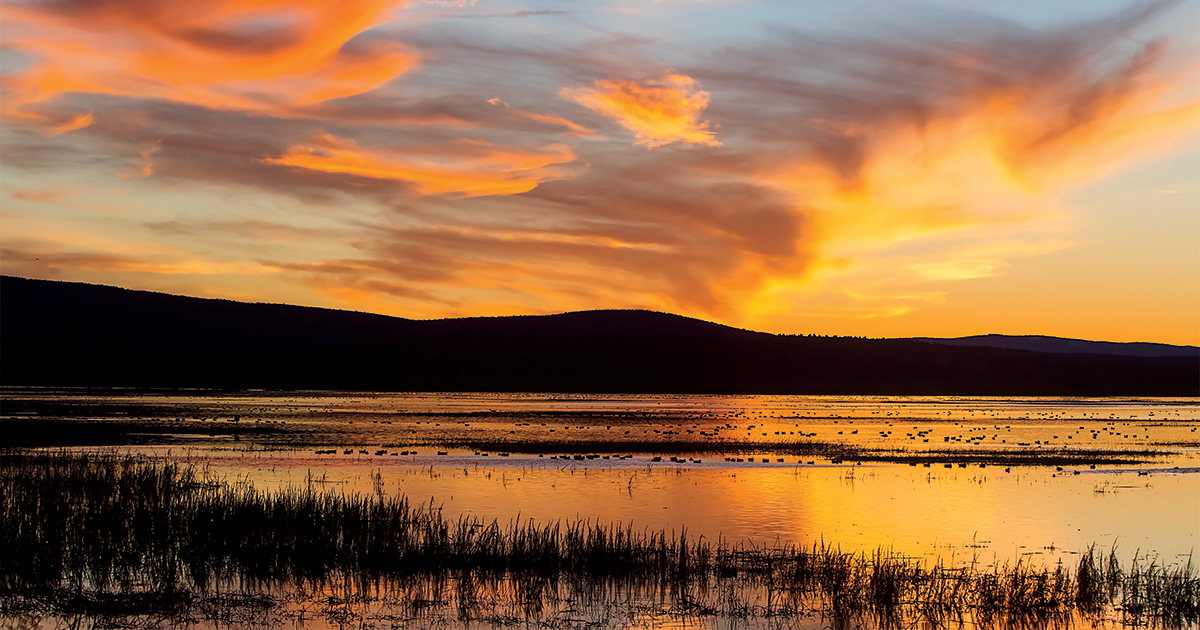Cupped Wings: Afterglow
Between getting skunked and getting a limit, there's a lot to appreciate about a duck hunt
Between getting skunked and getting a limit, there's a lot to appreciate about a duck hunt

I unload the shotgun and lean it against a cypress tree. It’s straight-up sunset, and the very last of legal shooting hours are marked with a few cricket chirps coming from the smartphone alarm in my wader pocket. I scratch Minnie’s ears and spend a moment taking it all in.
And of course, here they come: Wood ducks, a pair of mallards, and then a half-dozen geese, all sailing into the swamp like they own it. Which they do. In that magical half hour between sunset and dark-dark, the birds seem to know that they’re living with a hall pass. They bomb into the swamp without circling, with hardly a care in the world. I don’t begrudge the birds one bit for making it home safe.
I’d guess that most waterfowlers have a love-hate relationship with the fact that shooting hours for ducks and geese typically end at sunset, because many birds don’t show up over the decoys until that golden half-hour between the sun slipping fully below the horizon and where’s-my-flashlight dark.
But the rule makes sense, for both man and beast. For starters, it’s difficult to identify the species of ducks when the light turns dim and flat. And finding downed birds in fast-fading light is a challenge. And then there’s the issue of giving weary birds a chance to put down roots for the night without being overly harassed. Few things will move birds out of an area more quickly than shooting at them when they’ve clocked out for the day and are searching for a peaceful roost. I don’t view the sunset rule as cause for missed opportunity. I see it as more opportunity—a chance at better hunting in the days to come.
And it’s the days to come that I’m thinking about now. The next time I hunt this swamp, I think I’ll move about 20 yards farther out and set up just inside the flooded trees on the edge of the open water. Next time—I love thinking about the next time.
This is the waterfowler’s afterglow. The falling light, the cooling air, the first stars overhead—it’s a calming, peaceful quietude that rarely fails to prod me toward introspection.
I love a sunrise and never regret an early start. But at the end of a morning hunt, I’m too often rushed and distracted. As I wrap the decoys, I go over the to-do list that awaits me. I head back to the truck, hustling to get to work or home, get all this stuff put away, and get on with the day. An afternoon hunt, on the other hand, doesn’t seem to get bogged down with this kind of pressure. There’s time to sit back on a wet log and smell the swamp muck.
It’s a shame that the act of hunting too often comes with a scorecard. You shot ducks or you didn’t, right? That’s the metric. Not one person, ever, has asked me about all the intangibles that conspire to make a memorable hunt: How the last of the sunlight lit up the tips of the sweetgums so brightly that I thought they were going to burst into flame. How I’m pretty sure that river otter never knew I was there even though it swam within five feet of my wader boots. How I laughed when those two mallards juked me from behind, landing without ever giving me a shot and swimming out of range without ever flushing. Lucky ducks, those two.
And there’s something about walking out in the dark, the day done, the next hunt on the horizon, that seems to give me a calmness of spirit that is its own reward. There’s nothing waiting for me back at home that might upset the perfect apple cart of a sunset in a beaver swamp. Just a shower and a finger or two of brown water.
And gratitude. Between the close of shooting light and inky black dark, with the first hoots of the barred owls and the last whinnies of the wood ducks, I seem always to find my way to thanksgiving.